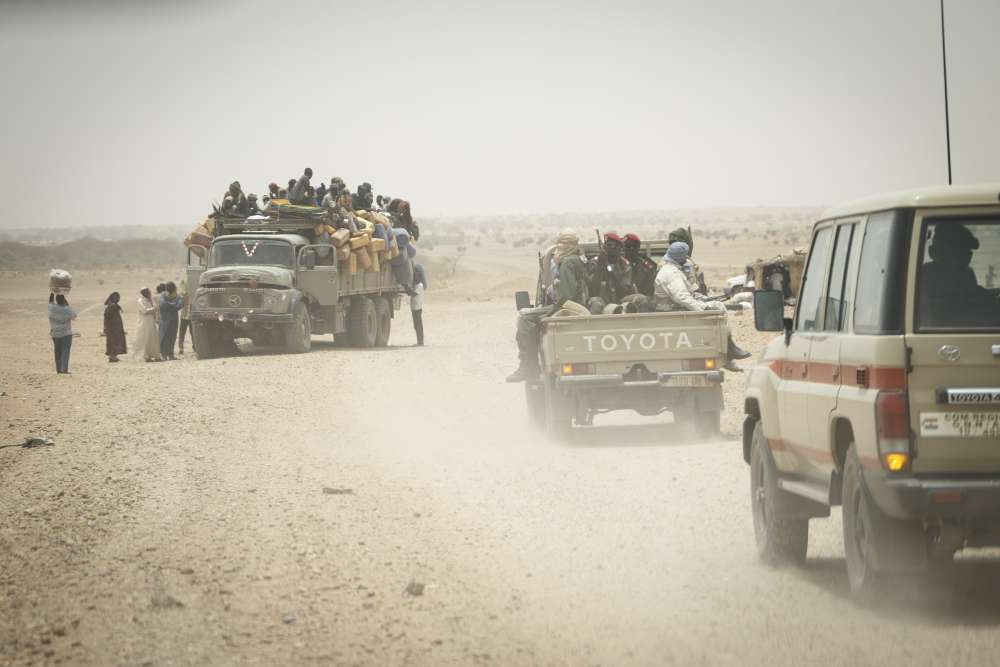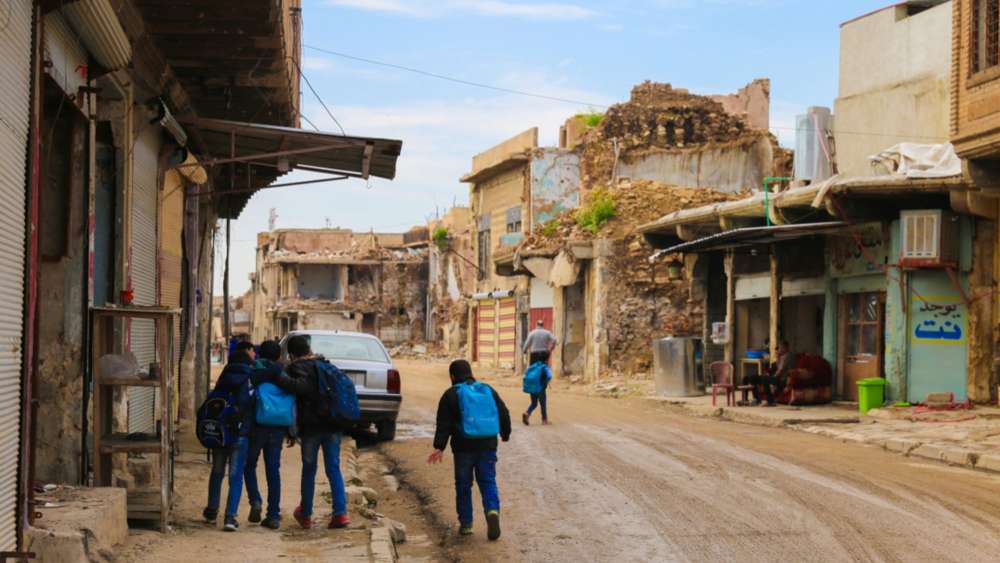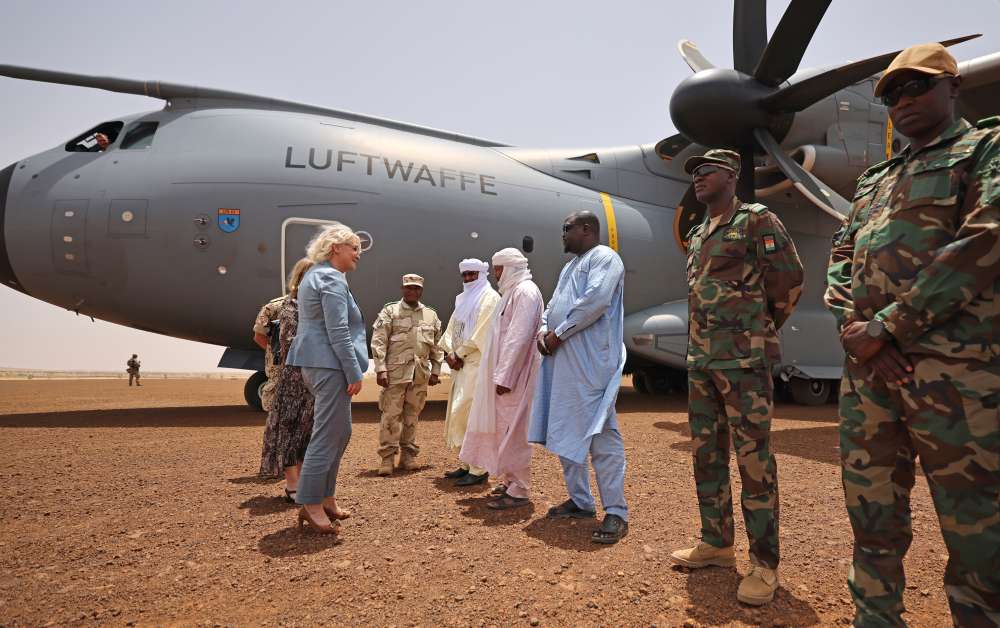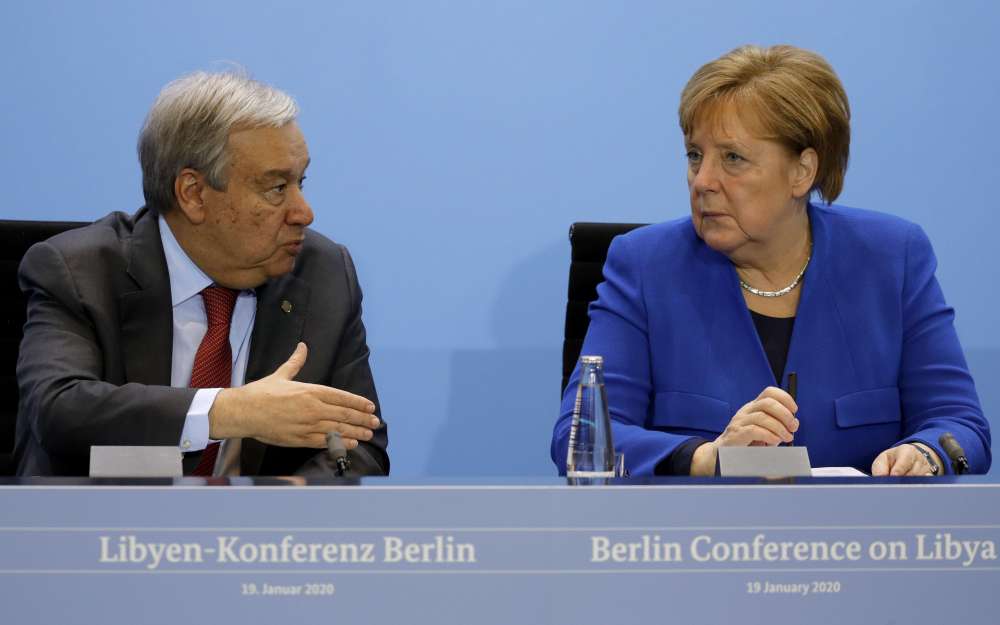German Security Policy in Africa: New Enemy, Same Mistakes?

Nigerian national guard soldiers on patrol close to Agadez, Niger. (Bundeswehr/Flickr)
Despite the rising power competition with Russia in Africa, Western countries should avoid repeating their mistakes of past counter-terrorism and stabilization campaigns. How threat inflation and no-strings-attached security assistance hinders the chances for peace.
The Russian project in Africa is a project of predation, said French President Emmanuel Macron at a recent summit between France and Tunisia. Paris is not alone in this view. The Biden Administration’s new policy for Sub-Saharan Africa has Russia sharply in focus, accusing them of “causing instability and then cashing in on the chaos.” Germany looks likely to follow the U.S., UK and others, in using its national security strategy to signal an end to two decades of counter-terrorism as the primary focus of its security policy in Africa (and elsewhere). Instead, it will likely pinpoint competition with Russia as a core security challenge.
With this shift of priority, Western policymakers should still be aware of the lessons from the last twenty years of counter-terrorism focused security policy in Africa. Two key lessons stand out: a lack of understanding of conflict drivers and threats leads to ineffective strategies, and supporting predatory regimes hinders the chances for peace. These lessons can serve as cautionary tales for those trying to counter Russian involvement in Africa. If these mistakes are repeated, it could reduce civic and democratic space, increase the likelihood of violent conflict, and potentially allow Russia to gain a stronger foothold on the continent.
» Western governments seem once again ready to sacrifice international norms on human rights. «
Lesson One: Understanding the drivers and the threats
The first lesson from past stabilization and counter-terrorism campaigns is the importance of developing a clear, context-specific understanding of what is driving conflict and insecurity. A report by Saferworld, drawing on examples from twenty years of international interventions in Afghanistan, Egypt, Kenya, Kyrgyzstan, Iraq, the Philippines, Somalia, Syria, Tunisia, Yemen, Mali, Niger and Burkina Faso, found that international policies consistently misunderstood conflict dynamics in conflicts involving terror groups. This often led to the same policies inadvertently reinforcing significant conflict drivers and resultantly worsening violence.
Two crucial elements that drove these weak assumptions were the misframing of conflicts to focus on violent groups and the consistent ‘threat inflation’. Labelling conflicts as just ‘terrorism’, gave easy soundbites, but made nuanced policy approaches more difficult. This led to a limited approach and created faulty assumptions about how to respond. It went hand-in-hand with a consistent threat inflation whereby perceived urgency to act led authorities, external actors and implementing organizations to push for rapid counter-terrorism action. Focusing on ‘terrorism’ necessitated ‘tough’ responses and deprioritized a perspective that sought to understand how to transform conflicts beyond an approach to simply degrade and destroy ‘terrorists’. In contexts like Nigeria, this approach fueled groups like Boko Haram, rather than diminishing them.
Lesson Two: Prioritize values in partnerships
The second common mistake with past engagements was that external interventions consistently compromised values and standards when it came to choosing partners, given the singular attention on counter-terrorism above all other issues. In Egypt, Somalia, Mali, Tunisia and elsewhere international strategies were so focused on countering ‘terrorism’, they often ignored many of the actual drivers and root causes of conflict. To deliver these strategies, funding and military support went to kleptocratic elites. They, in turn, were left to repress their citizens and shore-up their political power as long as they remained a partner for Western counter-terrorism objectives.
Giving these sorts of tools and resources to those regimes directly contributed to a slide towards authoritarianism across the continent. The cycle of (limited or) no-strings-attached security assistance, followed by human rights abuses, corruption and predation, together with the weakening of democratic and civic freedoms, has happened repeatedly over the past twenty years of Western security engagement in Africa. Western policymakers did not set out to undermine democracy, civic space, peace and human rights in Africa when they made the continent a battleground in their ‘war on terror’. But that is the impact they had. These consequences were not surprising; they happened consistently and predictably. However, a change in security policy focus offers a chance to fix these mistakes if we learn from them.
What does this have to do with policy towards Russia in Africa?
It is right to consider a policy to respond to Russia’s role in Africa. There is indeed much to be concerned about in their engagement across the continent. In Mali, Burkina Faso, the Central African Republic and Libya, Russian trainers have been providing a dangerous cocktail of anti-insurgency, counter-terrorism operations capacity building, as well as training to support the violent suppression of anti-governmental protests and demonstrations. This has all tied into an overarching strategy of elite capture — working to undermine democracy and prop up regimes that prey on society. It allows Russia to build influence, especially with undemocratic regimes, and present itself as a natural ally to African leaders. One which respects sovereignty unlike the meddling West. While alleged abuses by Wagner Group — such as the massacre of 300 people in Moura in March 2022 - have been the most reported aspect of this strategy, the full scope is much more deep-rooted and pernicious. The consequences are shrinking rights and democratic freedoms for citizens across the continent.
Yet, focusing solely on geostrategic competition with Russia could warp strategic thinking and allow rights and democratic freedoms to further erode. Western governments seem once again ready to sacrifice international norms on human rights. The announcement by the UK Foreign Secretary in December 2022 that the Foreign, Commonwealth and Development Office would downgrade their commitment to human rights for close diplomatic ties shows how worries about Russia are already leading to short-sighted strategies. For some, these policy aspirations require no-strings-attached security partnerships with military leaders across the continent — including countries with a poor record on human rights and corruption.
The Western response to Russia in Africa cannot replicate the acceptance of toxic partnerships that were familiar in counter-terrorism and stabilization missions. This would ultimately precipitate the sacrifice of many of the same international norms that should be protected. Supporting predatory elites risks reinforcing the very instability and chaos in which states like Russia (and their mercenaries) thrive and Western countries struggle to engage.
» The Western response to Russia in Africa cannot replicate the acceptance of toxic partnerships that were familiar in counter-terrorism and stabilization missions. «
Such a scenario would end up undermining the policy objectives of Germany and its allies, not to mention have tragic human consequences for those suffering at the sharp-end of these regimes. Certainly, counter-terrorism and stabilization strategies that have supported problematic partners often worsened the prospects for peace as governments gaining from external support lost interest in ending the conflict.
Furthermore, it could lead to a failure to understand the underlying reasons for why Russia can gain footholds in certain states. Some, such as Dr. Adam Sandor have argued that “for many people in the Central African Republic who have faced generalized insecurity for so long, it is a blessing to have [Wagner] there provided that don’t fall short and become victims of these actors themselves.” This does not excuse any of the abuses these same individuals and groups have committed. However, it does signal the need for a more nuanced and locally based understanding of the threat. It is clearly a mistake to simply see these contexts as areas to be ‘saved’ from Russian influence.
New tools based on past lessons
Before letting misguided assumptions dominate future policy towards Africa, there is a need for a pause and reflect. The writers of Germany’s national security strategy should review the ways in which ignoring local context and deprioritizing democratic values have in the past undermined peace and national security objectives. Our own reports on the failures and relative successes of stabilization and counter-terrorism campaigns of past, include insights that are as relevant for how to engage now as in the face of violent non-state armed groups. A study of Kenya, Colombia, Iraq and Northern Ireland highlighted that when progress was made towards addressing violent armed groups, there was a political, analytical and strategic shift towards security approaches being reoriented to provide security for people, build trust and keep the political pursuit of peace on track. These same lessons are front and center of the U.S.’s Global Fragility Act.
Key points:
- Past stabilization and counter-terrorism campaigns demonstrate the importance of developing a context-specific understanding of the conflict and not to solely focus on violent ‘terrorist’ groups.
- Supporting predatory regimes in an attempt to counter terrorism hinders the chances for peace.
- Germany should not downgrade its commitment to human rights in order to reduce Russian influence in Africa.
These lessons mean prioritizing the ‘reform’ part of security sector reform, and recognizing that capacity building a partners’ security forces without addressing governance issues does not, and has never, worked. There were also efforts to enable civil society to play a critical role in shaping peace processes and political settlements. As has been well documented by Saferworld, and others, people affected by conflict often have the most effective and sustainable solutions for addressing its drivers. Their views are vital for informing what works and what does not. This is no less true against another state threat than a non-state group.
Germany’s national security strategy should strive to think about the long-term impact of its engagement. Even if it also pinpoints competition with Russia as the key security threat on the African continent. There are lessons to be learnt looking at allies’ engagements over the past two decades, that Germany can draw from.
Abi Watson
Research Fellow, Global Public Policy Institute (GPPi)
Jordan Street
Saferworld, Senior Policy & Advocacy Lead
Keep on reading

Prioritizing the Protection of Civilians in National Security
When drafting security policy, those most affected by conflict are often missing from the equation. Applying a protection lens to Germany’s upcoming security strategy would be a way of putting civilians first.

Krisenprävention und Stabilisierung in Afrika: Drei Implikationen für die Nationale Sicherheitsstrategie
Krisenprävention, Stabilisierung und Friedensförderung sollten einen wichtigen Platz in der Nationalen Sicherheitsstrategie einnehmen. Dabei sollten nicht nur Bedrohungen, sondern auch Chancen betrachtet, Prinzipien für Kohärenz genannt und eine stärkere Wirksamkeitsüberprüfung sichergestellt werden.

“Progress in Peace Processes Often Results from Cumulative Efforts”
In a world marked by rising geopolitical tensions, Germany should use its international convening power and unique strengths as a state mediator and donor to support professional peacemaking practice.